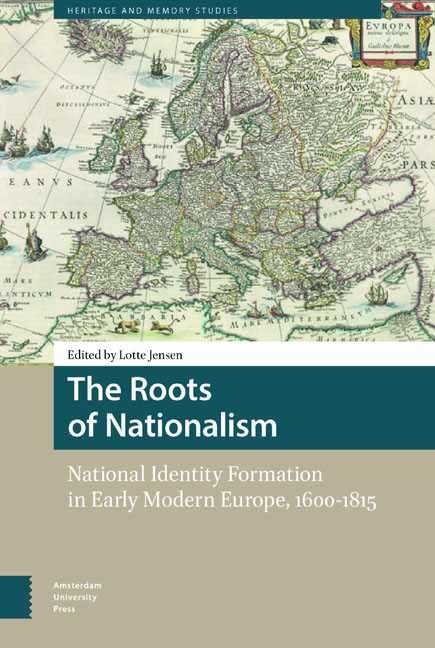Book contents
- Frontmatter
- Contents
- The Roots of Nationalism: Introduction
- Part One The Modernist Paradigm Contested
- Part Two The Genealogy of National Identity
- Part Three Negative Mirror Imaging
- Part Four Maps, Language and Canonisation
- Part Five Nation in the Age of Revolution
- List of Illustrations
- List of Contributors
- Index
6 - The Low Countries: Constitution, Nationhood and Character According to Hugo Grotius
Published online by Cambridge University Press: 03 February 2021
- Frontmatter
- Contents
- The Roots of Nationalism: Introduction
- Part One The Modernist Paradigm Contested
- Part Two The Genealogy of National Identity
- Part Three Negative Mirror Imaging
- Part Four Maps, Language and Canonisation
- Part Five Nation in the Age of Revolution
- List of Illustrations
- List of Contributors
- Index
Summary
In their mission statement the organisers of this conference profess their intention to challenge the widely accepted wisdom that concepts of nation and nationality in the way we understand them are only from the second half of the eighteenth century. It is obvious from almost every branch of art and intellectual thought that national sentiments achieved enormous prominence and flowering in Europe in the nineteenth century. Consequently, the view that nationality and the nation-state are typically nineteenth-century developments has achieved almost canonical status among historians. Given the rules of the historian's trade, which prescribe a constant, critical self-evaluation of the historical discipline, this means that it is time to scrutinise our treatment of these concepts, as is the aim of the present volume. For indeed, the premodern sources provide many grounds for tracing the origins of ideas and sentiments of nationality back to at least the early modern period, if not further.
Early modern texts abound with geographical characterisations that correspond roughly with the nation-states of modern Europe. Human character types attracted a great deal of attention in early modern literature; there is even a separate branch of early modern literature devoted to it, of which we will see one example later on in this article. ‘National’ character figures prominently among the character types in this literature.
On the other hand, there are many reasons for caution, for the differences with present-day perceptions and conceptualisations of nationhood are pervasive and fundamental, and have not by coincidence led to the view referred to above. To quote an example from the recent inaugural oration by Geert Janssen in Amsterdam: in spite of the enormous number of immigrants in Amsterdam at the beginning of the seventeenth century, the cohabitation of people from so many ethnic and geographical backgrounds does not seem to have caused any serious problems; indeed this cohabitation is rarely referred to or conceptualised explicitly in the sources.1 Religious affiliations, for example, seem to have been far more important to contemporary observers than the category of nationhood or ‘national’ background. Secondly, the early modern perception of nationhood must have been very different from ours and not, or at least to a much lesser degree, tied to the nation-state in its various aspects.
- Type
- Chapter
- Information
- The Roots of NationalismNational Identity Formation in Early Modern Europe, 1600–1815, pp. 135 - 152Publisher: Amsterdam University PressPrint publication year: 2016

